- Home
- Kate DiCamillo
The Tiger Rising
The Tiger Rising Read online
Also by Kate DiCamillo:
Because of Winn-Dixie
The Magician’s Elephant
The Miraculous Journey of Edward Tulane
The Tale of Despereaux
Mercy Watson to the Rescue
Mercy Watson Goes for a Ride
Mercy Watson Fights Crime
Mercy Watson: Princess in Disguise
Mercy Watson Thinks Like a Pig
Mercy Watson:
Something Wonky This Way Comes
Great Joy
This is a work of fiction. Names, characters, places, and incidents are either products of the author’s imagination or, if real, are used fictitiously.
Copyright © 2001 by Kate DiCamillo
Cover illustration copyright © 2001 by Chris Sheban
All rights reserved. No part of this book may be reproduced, transmitted, or stored in an information retrieval system in any form or by any means, graphic, electronic, or mechanical, including photocopying, taping, and recording, without prior written permission from the publisher.
First electronic edition 2009
The Library of Congress has cataloged the hardcover edition as follows:
DiCamillo, Kate.
The tiger rising / Kate DiCamillo. — 1st ed.
p. cm.
Summary: Rob, who passes the time in his rural Florida community by wood carving, is drawn by his spunky but angry friend Sistine into a plan to free a caged tiger.
ISBN 978-0-7636-0911-5 (hardcover)
[1. Tigers — Fiction. 2. Animals — Treatment — Fiction. 3. Wood carving — Fiction. 4. Friendship — Fiction. 5. Florida — Fiction.] I. Title.
PZ7.D54156 Ti 2001
[Fic] — dc21 99-088635
ISBN 978-0-7636-1898-8 (paperback)
ISBN 978-0-7636-4944-9 (electronic)
Candlewick Press
99 Dover Street
Somerville, Massachusetts 02144
visit us at www.candlewick.com
For my brother
I am grateful to Matt Pogatshnik
for giving me the music,
Bill Mockler for always reading,
the McKnight Foundation
for bestowing peace of mind,
Jane Resh Thomas for shining a
light on the path, Tracey Bailey
and Lisa Beck for being my
“death of the hired man” friends,
my mother for telling me not
to give up, and to Kara LaReau
for believing that I could . . .
and that I can. And that I will.
That morning, after he discovered the tiger, Rob went and stood under the Kentucky Star Motel sign and waited for the school bus just like it was any other day. The Kentucky Star sign was composed of a yellow neon star that rose and fell over a piece of blue neon in the shape of the state of Kentucky. Rob liked the sign; he harbored a dim but abiding notion that it would bring him good luck.
Finding the tiger had been luck, he knew that. He had been out in the woods behind the Kentucky Star Motel, way out in the woods, not really looking for anything, just wandering, hoping that maybe he would get lost or get eaten by a bear and not have to go to school ever again. That’s when he saw the old Beauchamp gas station building, all boarded up and tumbling down; next to it, there was a cage, and inside the cage, unbelievably, there was a tiger — a real-life, very large tiger pacing back and forth. He was orange and gold and so bright, it was like staring at the sun itself, angry and trapped in a cage.
It was early morning and it looked like it might rain; it had been raining every day for almost two weeks. The sky was gray and the air was thick and still. Fog was hugging the ground. To Rob, it seemed as if the tiger was some magic trick, rising out of the mist. He was so astounded at his discovery, so amazed, that he stood and stared. But only for a minute; he was afraid to look at the tiger for too long, afraid that the tiger would disappear. He stared, and then he turned and ran back into the woods, toward the Kentucky Star. And the whole way home, while his brain doubted what he had seen, his heart beat out the truth to him. Ti-ger. Ti-ger. Ti-ger.
That was what Rob thought about as he stood beneath the Kentucky Star sign and waited for the bus. The tiger. He did not think about the rash on his legs, the itchy red blisters that snaked their way into his shoes. His father said that it would be less likely to itch if he didn’t think about it.
And he did not think about his mother. He hadn’t thought about her since the morning of the funeral, the morning he couldn’t stop crying the great heaving sobs that made his chest and stomach hurt. His father, watching him, standing beside him, had started to cry, too.
They were both dressed up in suits that day; his father’s suit was too small. And when he slapped Rob to make him stop crying, he ripped a hole underneath the arm of his jacket.
“There ain’t no point in crying,” his father had said afterward. “Crying ain’t going to bring her back.”
It had been six months since that day, six months since he and his father had moved from Jacksonville to Lister, and Rob had not cried since, not once.
The final thing he did not think about that morning was getting onto the bus. He specifically did not think about Norton and Billy Threemonger waiting for him like chained and starved guard dogs, eager to attack.
Rob had a way of not-thinking about things. He imagined himself as a suitcase that was too full, like the one that he had packed when they left Jacksonville after the funeral. He made all his feelings go inside the suitcase; he stuffed them in tight and then sat on the suitcase and locked it shut. That was the way he not-thought about things. Sometimes it was hard to keep the suitcase shut. But now he had something to put on top of it. The tiger.
So as he waited for the bus under the Kentucky Star sign, and as the first drops of rain fell from the sullen sky, Rob imagined the tiger on top of his suitcase, blinking his golden eyes, sitting proud and strong, unaffected by all the not-thoughts inside straining to come out.
“Looky here,” said Norton Threemonger as soon as Rob stepped onto the school bus. “It’s the Kentucky Star. How’s it feel to be a star?” Norton stood in the center of the aisle, blocking Rob’s path.
Rob shrugged.
“Oh, he don’t know.” Norton called to his brother. “Hey, Billy, he don’t know what it’s like to be a star.”
Rob slipped past Norton. He walked all the way to the back of the bus and sat down in the last seat.
“Hey,” said Billy Threemonger, “you know what? This ain’t Kentucky. This is Florida.”
He followed Rob and sat down right next to him. He pushed his face so close that Rob could smell his breath. It was bad breath. It smelled metallic and rotten. “You ain’t a Kentucky star,” Billy said, his eyes glowing under the brim of his John Deere cap. “And you sure ain’t a star here in Florida. You ain’t a star nowhere.”
“Okay,” said Rob.
Billy shoved him hard. And then Norton came swaggering back and leaned over Billy and grabbed hold of Rob’s hair with one hand, and with the other hand, ground his knuckles into Rob’s scalp.
Rob sat there and took it. If he fought back, it lasted longer. If he didn’t fight back, sometimes they got bored and left him alone. They were the only three kids on the bus until it got into town, and Mr. Nelson, the driver, pretended like he didn’t know what was going on. He drove staring straight ahead, whistling songs that didn’t have any melody. Rob was on his own, and he knew it.
“He’s got the creeping crud all over him,” said Billy. He pointed at Rob’s legs. “Look,” he said to Norton. “Ain’t it gross?”
“Uh-huh,” said Norton. He was concentrating on grinding his knuckles into Rob’s head. It hurt, but Rob didn’t cry
. He never cried. He was a pro at not-crying. He was the best not-crier in the world. It drove Norton and Billy Threemonger wild. And today, Rob had the extra power of the tiger. All he had to do was think about it, and he knew there was no way he would cry. Not ever.
They were still out in the country, only halfway into town, when the bus lurched to a stop. This was such a surprising development, to have the bus stop halfway through its route, that Norton stopped grinding his knuckles into Rob’s scalp and Billy stopped punching Rob in the arm.
“Hey, Mr. Nelson,” Norton shouted. “Whatcha doin’?”
“This ain’t a stop, Mr. Nelson,” Billy called out helpfully.
But Mr. Nelson ignored them. He kept whistling his non-song as he swung open the bus door. And while Norton and Billy and Rob watched, openmouthed and silent, a girl with yellow hair and a pink lacy dress walked up the steps and onto the bus.
Nobody wore pink lacy dresses to school. Nobody. Even Rob knew that. He held his breath as he watched the girl walk down the aisle of the bus. Here was somebody even stranger than he was. He was sure.
“Hey,” Norton called, “this is a school bus.”
“I know it,” the girl said. Her voice was gravelly and deep, and the words sounded clipped and strange, like she was stamping each one of them out with a cookie cutter.
“You’re all dressed up to go to a party,” Billy said. “This ain’t the party bus.” He elbowed Rob in the ribs.
“Haw.” Norton laughed. He gave Rob a friendly thud on the head.
The girl stood in the center of the aisle, swaying with the movement of the bus. She stared at them. “It’s not my fault you don’t have good clothes,” she said finally. She sat down and put her back to them.
“Hey,” said Norton. “We’re sorry. We didn’t mean nothing. Hey,” he said again. “What’s your name?”
The girl turned and looked at them. She had a sharp nose and a sharp chin and black, black eyes.
“Sistine,” she said.
“Sistine,” hooted Billy. “What kind of stupid name is that?”
“Like the chapel,” she said slowly, making each word clear and strong.
Rob stared at her, amazed.
“What are you looking at?” she said to him.
Rob shook his head.
“Yeah,” said Norton. He cuffed Rob on the ear. “What are you staring at, disease boy? Come on,” he said to Billy.
And together, they swaggered up the aisle of the bus and sat in the seat behind the new girl.
They whispered things to her, but Rob couldn’t hear what they were saying. He thought about the Sistine Chapel. He had seen a picture of it in the big art book that Mrs. Dupree kept on a small shelf behind her desk in the library. The pages of the book were slick and shiny. And each picture made Rob feel cool and sweet inside, like a drink of water on a hot day. Mrs. Dupree let Rob look at the book because he was quiet and good in the library. It was her reward to him.
In the book, the picture from the ceiling of the Sistine Chapel showed God reaching out and touching Adam. It was like they were playing a game of tag, like God was making Adam “it.” It was a beautiful picture.
Rob looked out the window at the gray rain and the gray sky and the gray highway. He thought about the tiger. He thought about God and Adam. And he thought about Sistine. He did not think about the rash. He did not think about his mother. And he did not think about Norton and Billy Threemonger. He kept the suitcase closed.
Sistine was in Rob’s sixth-grade homeroom class. Mrs. Soames made her stand up and introduce herself.
“My name,” she said in her gravelly voice, “is Sistine Bailey.” She stood at the front of the room, in her pink dress. And all the kids stared at her with open mouths as if she had just stepped off a spaceship from another planet. Rob looked down at his desk. He knew not to stare at her. He started working on a drawing of the tiger.
“What a lovely name,” said Mrs. Soames.
“Thank you,” said Sistine.
Patrice Wilkins, who sat in front of Rob, snorted and then giggled and then covered her mouth.
“I’m from Philadelphia, Pennsylvania,” Sistine said, “home of the Liberty Bell, and I hate the South because the people in it are ignorant. And I’m not staying here in Lister. My father is coming to get me next week.” She looked around the room defiantly.
“Well,” said Mrs. Soames, “thank you very much for introducing yourself, Sistine Bailey. You may take your seat before you put your foot in your mouth any farther.”
The whole class laughed at that. Rob looked up just as Sistine sat down. She glared at him. Then she stuck her tongue out at him. Him! He shook his head and went back to his drawing.
He sketched out the tiger, but what he wanted to do was whittle it in wood. His mother had shown him how to whittle, how to take a piece of wood and make it come alive. She taught him when she was sick. He sat on the edge of the bed and watched her tiny white hands closely.
“Don’t jiggle that bed,” his father said. “Your mama’s in a lot of pain.”
“He ain’t hurting me, Robert,” his mother said.
“Don’t get all tired out with that wood,” his father said.
“It’s all right,” his mother said. “I’m just teaching Rob some things I know.”
But she said she didn’t have to teach him much. His mother told him he already knew what to do. His hands knew; that’s what she said.
“Rob,” said the teacher, “I need you to go to the principal’s office.”
Rob didn’t hear her. He was working on the tiger, trying to remember what his eyes looked like.
“Robert,” Mrs. Soames said. “Robert Horton.” Rob looked up. Robert was his father’s name. Robert was what his mother had called his father. “Mr. Phelmer wants to see you in his office. Do you understand?”
“Yes, ma’am,” said Rob.
He got up and took his picture of the tiger and folded it up and put it in the back pocket of his shorts. On his way out of the classroom, Jason Uttmeir tripped him and said, “See you later, retard,” and Sistine looked up at him with her tiny black eyes. She shot him a look of pure hate.
The principal’s office was small and dark and smelled like pipe tobacco. The secretary looked up at Rob when he walked in. “Go right on back,” she said, nodding her big blond head of hair. “He’s waiting for you.”
“Rob,” said Mr. Phelmer when Rob stepped into his office.
“Yes, sir,” said Rob.
“Have a seat,” Mr. Phelmer said, waving his hand at the orange plastic chair in front of his desk.
Rob sat down.
Mr. Phelmer cleared his throat. He patted the piece of hair that was combed over his bald head. He cleared his throat again. “Rob, we’re a bit worried,” he finally said.
Rob nodded. This was how Mr. Phelmer began all his talks with Rob. He was always worried: worried that Rob did not interact with the other students, worried that he did not communicate, worried that he wasn’t doing well, in any way, at school.
“It’s about your, uh, legs. Yes. Your legs. Have you been putting that medicine on them?”
“Yes, sir,” said Rob. He didn’t look at Mr. Phelmer. He stared instead at the paneled wall behind the principal’s head. It was covered with an astonishing array of framed pieces of paper — certificates and diplomas and thank-you letters.
“May I, uh, look?” asked Mr. Phelmer. He got up from his chair and came halfway around his desk and stared at Rob’s legs.
“Well, sir,” he said after a minute. He went back behind his desk and sat down. He folded his hands together and cracked his knuckles. He cleared his throat.
“Here’s the situation, Rob. Some of the parents — I won’t mention any names — are worried that what you’ve got there might be contagious, contagious meaning something that the other students could possibly catch.” Mr. Phelmer cleared his throat again. He stared at Rob.
“Tell me the truth, son,” he said. “Have
you been using that medicine you told me about? The stuff that doctor in Jacksonville gave you? Have you been putting that on?”
“Yes, sir,” said Rob.
“Well,” said Mr. Phelmer, “let me tell you what I think. Let me be up-front and honest with you. I think it might be a good idea if we had you stay home for a few days. What we’ll do is just give that old medicine more of a chance to kick in, let it start working its magic on you, and then we’ll have you come back to school when your legs have cleared up. What do you think about that plan?”
Rob stared down at his legs. He felt the picture of the tiger burning in his pocket. He concentrated on keeping his heart from singing out loud with joy.
“Yes, sir,” he said slowly, “that would be all right.”
“That’s right,” said Mr. Phelmer. “I thought you would think it’s a good plan. I’ll tell you what I’ll do. I’ll just write your parents — I mean your father — a note, and tell him what’s what; he can give me a call if he wants. We can talk about it.”
“Yes, sir,” said Rob again. He kept his head down. He was afraid to look up.
Mr. Phelmer cleared his throat and scratched his head and adjusted his piece of hair, and then he started to write.
When he was done, he handed the note to Rob; Rob took it, and when he was outside the principal’s office, he folded the piece of paper up carefully and put it in his back pocket with the drawing of the tiger.
And then, finally, he smiled. He smiled because he knew something Mr. Phelmer did not know. He knew that his legs would never clear up.
He was free.
Rob floated through the rest of the morning. He went to math class and civics and science, his heart light, buoyed by the knowledge that he would never have to come back.
At lunch, he sat out on the benches in the breezeway. He did not go into the lunchroom; Norton and Billy Threemonger were there. And nothing had tasted good to him since his mother died, especially not the food at the school. It was worse than the food his father tried to cook.

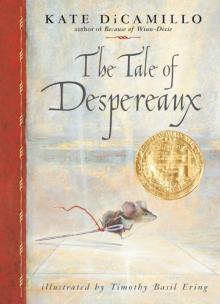 The Tale of Despereaux
The Tale of Despereaux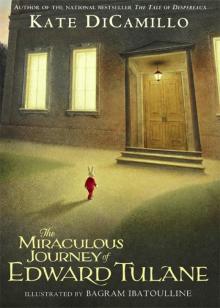 The Miraculous Journey of Edward Tulane
The Miraculous Journey of Edward Tulane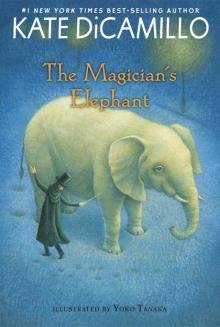 The Magician's Elephant
The Magician's Elephant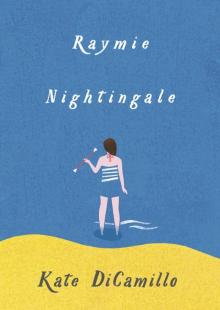 Raymie Nightingale
Raymie Nightingale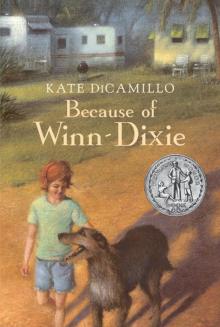 Because of Winn-Dixie
Because of Winn-Dixie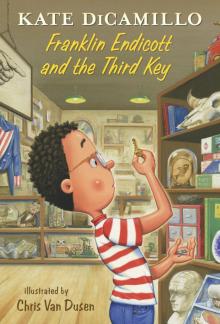 Franklin Endicott and the Third Key
Franklin Endicott and the Third Key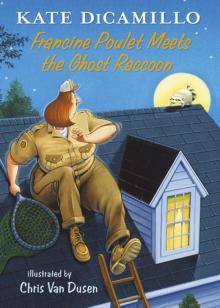 Francine Poulet Meets the Ghost Raccoon
Francine Poulet Meets the Ghost Raccoon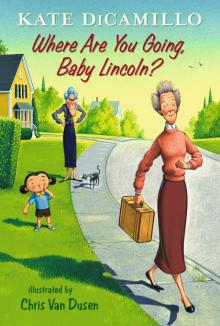 Where Are You Going, Baby Lincoln?
Where Are You Going, Baby Lincoln?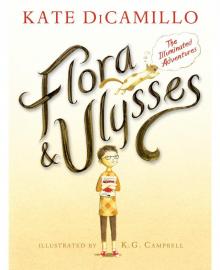 Flora & Ulysses: The Illuminated Adventures
Flora & Ulysses: The Illuminated Adventures Beverly, Right Here
Beverly, Right Here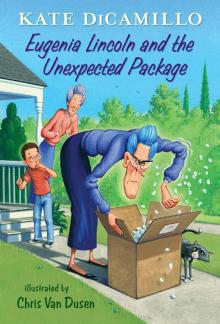 Eugenia Lincoln and the Unexpected Package
Eugenia Lincoln and the Unexpected Package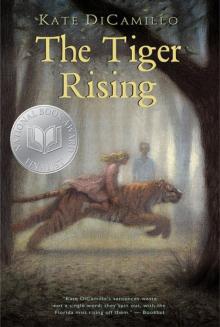 The Tiger Rising
The Tiger Rising The Beatryce Prophecy
The Beatryce Prophecy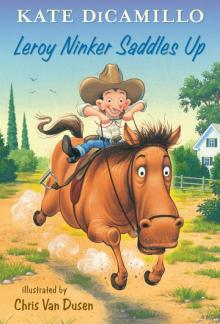 Leroy Ninker Saddles Up
Leroy Ninker Saddles Up